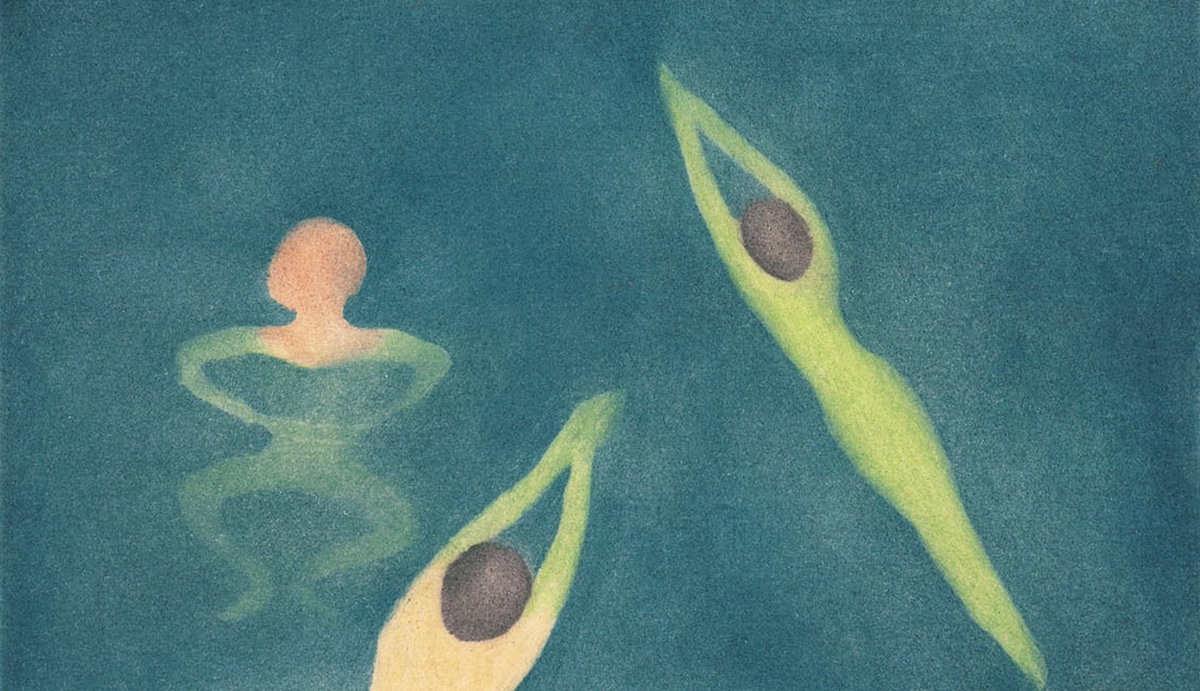Harrison Butker’s controversial commencement speech has alerted the nation to an important political phenomenon: some young American men are espousing both radical rightwing politics and a distinct version of Catholicism to go along with it. Where does this movement come from, and why is it happening now? One must take an honest look at the political and cultural reality that produced the class of 2024 to begin to understand.
I attended a conservative Catholic college very similar to Benedictine College. It seemed to me then—a female, liberal Protestant with an atheist dad and ex-Berkeley hippie mom—that the traditional Catholics really had something going for them. The families I witnessed with homemaker wives caring for lots of children appeared to actually be happy. Genuinely, unironically happy. My childhood had not featured many happy adults and children, and most of my friends’ homes were broken by divorce. The evident happiness of many traditional Catholic families inspired me to study and seriously consider the Catholic faith, and I eventually converted.
Despite the cacophony of online dissent, I suspect that Harrison Butker’s speech appealed to more young viewers than it repelled. Happiness, particularly a confident happiness, is more appealing to most young people than a sober argument. Butker’s remarks are not argued, nor carefully reasoned through, but rather delivered up as ready conclusions. He makes happiness look so easy. Can we blame Benedictine college graduates for giving him a standing ovation?
After all, what realistic paths to happiness are offered to young people today? American culture presents very few normative life scripts without criticism. In place of the old mainstream American dream, two divergent ways of pursuing happiness are implicitly on offer from the American left and right: happiness through collective agitation for “social justice,” or happiness through a return to traditional gender roles and family life.
The progressive worldview that dominates most college campuses counsels young people to identify and fight injustice and oppression. Whites in general and heterosexual white males in particular are advised to check their privilege, to own their share of the blame for colonialism, racism, and sexism, and generally to work to become advocates for the oppressed. Minorities are counseled to break free from whatever oppresses them. To the young, the progressive vision appears grim, because the goal is something only the group can achieve. There is no individual agency or actualization. From the progressive perspective, that’s not necessarily a strike against it. Nevertheless, unless the group as a whole fully casts off oppression, happiness remains out of reach for any one person.
Butker’s comments, on the other hand, present to the young a guiltless and self-directed path to actual happiness, empowering young men in particular to fashion themselves and their own families according to older, more “traditional” roles long regarded as conducive to human happiness. Tradition looks more simple, more true, more trust-worthy than what modern institutions—and the adults who lead them—offer the class of 2024.
Unspeakable Truths
The difficult truth, which Butker touches on in the beginning of his address, is that the Covid lockdowns and their aftermath have done something profound to the youth in this country. The adults fell down on the job, and our educational, economic and religious institutions went down with them. Imagine having years of your childhood upended “for public health.” Imagine coming to the quiet realization that many of those sacrifices—which were offered up on your behalf by the adults in your life—were probably in vain. We now know that school closures and quarantining the healthy did significant harm to just about everything but the virus.
For the remainder of his speech, Butker delivers a kind of Rightwing Bro Gospel, offering a pretty accurate representation of the conflicts facing right-leaning young men. These lost boys are conservative, yet they do not wish to conserve anything about modern American culture. Instead, many are sifting through hundreds—if not thousands—of years of Western Civilization in search of the competent adults and institutions their childhoods seemed to lack.
Can traditional Catholicism offer this? It seems obvious to Butker that it can. The Gospel according to Butker declares that men can find happiness by being masculine, speaking out in defense of the truth (and against their church’s own authority, the Bishops), focusing on their families and their vocations—and attending the Traditional Latin Mass (TLM).
One can forgive the uninitiated their shock and disgust at elements of Butker’s speech. Indeed, parts of it were off the rails even for devout Catholics, such as his not-so-subtle dig at natural family planning—an official teaching of the Church—his flirtation with anti-semitic themes, and his dismissal of the local non-TLM parish.
From the lost boys’ perspective, however, the ordinary Catholic parish is yet another example of an institution that fell down on the job: shutting its doors to the faithful during the most terrifying time of their lives, refusing to offer funeral services, last rites, and the most basic avenues of sanctifying grace the Church owes to Her faithful. There have been no apologies, no mea culpas. Like every other institution, the Catholic Church in America has simply moved on, quietly reopening shuttered parishes and—without even a blush of shame—imploring the faithful to return to Church in person, donation envelopes in hand. Meanwhile, traditional religious communities offering the Latin Mass remained open (sometimes outdoors), their priests braving infection to bring the sacraments to their flock.
In light of all of this, perhaps we might forgive Butker his rebelliousness against modernity, even his lack of wisdom, which he himself admits. Like all young people today, Butker is searching in the dark for a road to happiness, with few institutions or adults he can respect to guide him. How absurd to be a young conservative with no elders and no living traditions to embrace.
The Women
For the rest of us, Butker’s comments to and about women were perhaps the hardest to endure without wincing. The poor kid didn’t even say that most women should stay home, or that women who wish to work should deny themselves that option. He simply stated very confidently, at a college graduation in the year 2024, that most women want to have families and raise children, and that likely most of the female graduates there would find the greatest amount of happiness in doing so. As proof of this, he offered the happiness of his own wife, who has set aside her own career ambitions to become a homemaker.
The devil is in the details. The part left unsaid is that women must wait around for men like Butker to propose. Even if they would indeed be happy as homemakers married to multimillionaire NFL players, women must come up with some sort of contingency plan should that scenario fail to materialize. The majority of female graduates—even those who do find a virtuous young man with whom to build a life—will find a particularly punishing economy and astronomical cost of living awaits them, making it difficult for a family to get by on one income, even if they want to.
Butker’s simplistic view of the challenges that women face obscures the complexities of female happiness. The different virtues needed to produce both a successful family and a gratifying presence outside the home are very difficult to cultivate simultaneously, yet they are nevertheless desirable. Women’s desire for honor and a role in the public sphere is not the fruit of modern feminism and lies. It is borne of the human desire for excellence. Some women are clearly inclined to either homemaking or work life, but our particular aptitude for one or the other should not be confused with our true calling, which is to cultivate all of the virtues.
Statistically, young women in America are not nearly as attracted to right-wing politics, nor to Butker’s version of traditional Catholicism, as are young men. Butker’s speech offers us clues as to why. He prefaces his remarks to female graduates with the statement that women are the most lied to by our society, the most deceived by modernity. Yet, in my twenty years of experience in very conservative Catholic circles, I have known far, far more young women who wish to be married than young men who wish to marry them. Are the men not also victims to lies?
Modern feminism is a response to what the sexual revolution did to men. Once it became clear that most men could not be relied upon for fidelity and security, women had to come up with an alternative plan for survival. Progressivism was only too happy to oblige them in creating an alternative social structure to replace the traditional family, in return for women’s fidelity at the ballot box. Lies were told, to be sure, but modernity’s encouragement and condoning of unlimited male sexual gratification presented women with few real options.
One cannot dismiss the very real happiness and good fortune Mrs. Butker no doubt enjoys. The greatest selling point of Mrs. Butker’s husband’s speech is that he offered a confident way forward for a generation of young people. Yet a college, even a traditional Catholic college, might save a thought or two for the large group of women who, under Butker’s tutelage, must wait in vain for proposals they will never receive. Or the sizable number of women who will both marry and find the fulfillment of their vocation in some combination of work and homemaking. Or the decent number of female college graduates who in fact do not wish to marry at all. Butker seems happy to conclude that feminism and lies have delivered these women into their current predicament, but this is a little too convenient.
Harrison Butker paints a picture of modern America in which scores of faithful, dependable men with traditional values wait in vain for women to turn away from the lies of modernity and see what’s waiting right in front of them. This is a child’s fantasy. The Right’s lost boys might believe it and still prosper, but women in 2024 America do not have that luxury. They must live in the reality the sexual revolution and our post-pandemic economy have delivered to them.



